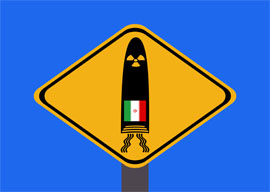
January 10, 2017

Source: BIgstock
Though every Republican in Congress voted against the Iran nuclear deal, “Tearing it up … is not going to happen,” says Sen. Bob Corker, chairman of the Foreign Relations Committee.
Hopefully, the chairman speaks for the president-elect.
During the campaign, Donald Trump indicated as much, saying that, though the U.S. got jobbed in the negotiations—“We have a horrible contract, but we do have a contract”—he might not walk away.
To Trump, a deal’s a deal, even a bad one. And we did get taken.
In 2007 and 2011, all 17 U.S. intelligence agencies assured us, “with high confidence,” that Iran did not have an atomic bomb program.
Yet our folks forked over $50 billion for an Iranian show and tell to prove they were not doing what our 17 intelligence agencies told us, again and again, they were not doing.
Why did we disbelieve our own intelligence, and buy into the “Chicken Little” chatter about Iran being “only months away from a bomb”?
Corker also administered a cold shower to those who darkly warn of a secret Iranian program to produce a bomb: “In spite of all the flaws in the agreement, nothing bad is going to happen relative to nuclear development in Iran in the next few years. It’s just not.”
Under the deal, Iran has put two-thirds of the 19,000 centrifuges at Natanz in storage, ceased enriching uranium to 20 percent at Fordow, poured concrete into the core of its heavy water reactor at Arak, and shipped 97 percent of its enriched uranium out of the country. Cameras and United Nations inspectors are all over the place.
Even should Iran decide on a crash program to create enough fissile material for a single A-bomb test, this would take a year, and we would know about it.
But why would they? After all, there are sound reasons of state why Iran decided over a decade ago to forego nuclear weapons.
Discovery of a bomb program could bring the same U.S. shock and awe as was visited on Iraq for its nonexistent WMD. Discovery would risk a pre-emptive strike by an Israel with scores of nuclear weapons. Saudi Arabia and Turkey would have a powerful inducement to build their own bombs.
Acquiring a nuclear weapon would almost surely make Iran, a Persian nation on the edge of a sea of Arabs, less secure.
If, however, in the absence of a violation of the treaty by Iran, we tore up the deal, we could find ourselves isolated. For Britain, France and Germany also signed, and they believe the agreement is a good one.
Do we really want to force these NATO allies to choose between the deal they agreed to and a break with the United States?
If the War Party is confident Iran is going to cheat, why not wait until they do. Then make our case with evidence, so our allies can go with us on principle, and not from pressure.
Also at issue is the deal signed by Boeing to sell Iran 80 jetliners. Airbus has contracted to sell Iran 100 planes, and begun delivery. List price for the two deals: $34.5 billion. Tens of thousands of U.S. jobs are at stake.
Is a Republican Congress prepared to blow up the Boeing deal and force the Europeans to cancel the Airbus deal?